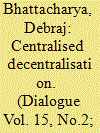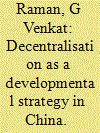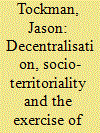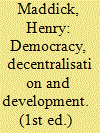|
|
|
Sort Order |
|
|
|
Items / Page
|
|
|
|
|
|
|
| Srl | Item |
| 1 |
ID:
122580


|
|
|
| 2 |
ID:
095592


|
|
|
|
|
| Publication |
2010.
|
| Summary/Abstract |
This study examines knowledge-based urban development in Beijing with the objective of revealing the impact of the 'synergetic' forces of globalisation and local government intervention on knowledge-based urban development in the context of the coexisting processes of globalisation and decentralisation. The findings in this paper show that due to the rapid growth of the cultural industry sector, knowledge-based urban development has created various kinds of 'cultural industry clustered areas', which were recently promoted by the 2008 Olympic Games. 'Synergetic' global and local forces are leading knowledge-based urban development, with the emergence of a local coalition regime in which local government manages local development, considered as 'enterprises' in the decentralisation process, while the State retains a significant influence on knowledge-based urban development. The central and municipal governments tend to emphasise strategies to 'facilitate the climate for growth' rather than the centrally planned control they exerted prior to the 1980s.
|
|
|
|
|
|
|
|
|
|
|
|
|
|
|
|
| 3 |
ID:
074733


|
|
|
|
|
| Publication |
2006.
|
| Summary/Abstract |
In Indonesia, positions in the Civil Service are subject to hidden market transactions. The demand for stable sources of income is high, and lack of transparency makes sales possible by government officers in core positions. The recent decentralization reforms have blurred borders of responsibility and lines of reporting in the bureaucracy and facilitated increasing rent-seeking at local levels. The article reports from a study of payment for government positions in an urban and a rural district in a province in Indonesia, Nusa Tenggara Barat. The survey reveals that prices for positions are rising and vary among departments in accordance with available opportunities to boost their income. Prices are higher where many projects are available and the compensation is good. The article concludes that current practices are unethical and hurt the society and that increased transparency in employment procedures must be in place before things can get any better.
|
|
|
|
|
|
|
|
|
|
|
|
|
|
|
|
| 4 |
ID:
167692


|
|
|
|
|
| Summary/Abstract |
The Indian state has undergone significant transformation since the late 1980s, most notably the extensive decentralisation of power, with consequences for the formation and implementation of Indian foreign policy. This article explores the role of India’s constituent states explaining the extent and limitations of their autonomy and influence. It deploys and extends the state transformation approach to incorporate considerations of issue area and coalition type. Under coalitions led by typical national parties, subnational governments are less likely to influence foreign and security policy. Under the same coalition type, they are more likely to behave autonomously on non-traditional security issues such as sharing of water resources with neighbouring countries. They are less likely to behave autonomously on security issues such as the transnational expression of ethnic solidarity. Under coalitions led by atypical national parties or regional parties, subnational governments are likely to exercise a moderate level of autonomy and influence on issue areas such as transnational expression of ethnic solidarity. They are likely to exercise a high level of autonomy and influence on non-traditional security issues such as sharing of water resources. The framework is illustrated through Tamil Nadu’s activism on Sri Lanka, and West Bengal’s position on water-sharing with Bangladesh.
|
|
|
|
|
|
|
|
|
|
|
|
|
|
|
|
| 5 |
ID:
126664


|
|
|
| 6 |
ID:
120628


|
|
|
|
|
| Publication |
2013.
|
| Summary/Abstract |
For the past decade, China has faced an extremely sharp rise in property prices and increasingly large investments made in this sector. Although some economists consider this change to be no more than the result of the increase in urban salaries that has gone hand-in-hand with China's strong economic growth, this article will show that it is in fact a "property bubble" resulting from the speculative activities of certain economic agents operating in this sector. Local authorities play a major role in this, especially in their efforts to increase their income, and their behaviour needs to be analysed in order to better understand that a bursting of this bubble might expose economic problems of a far deeper structural nature than those usually identified.
|
|
|
|
|
|
|
|
|
|
|
|
|
|
|
|
| 7 |
ID:
103992


|
|
|
|
|
| Publication |
2011.
|
| Summary/Abstract |
Citizenship is usually regarded as the exclusive domain of the state. However, changes to the structure of states resulting from decentralisation and globalisation have required a re-conceptualisation of citizenship, as authority is dispersed, identities multiply and political entitlements vary across territorial levels. Decentralisation has endowed regions with control over a wide range of areas relating to welfare entitlements, education and cultural integration that were once controlled by the state. This has created a new form of 'regional citizenship' based on rights, participation and membership at the regional level. The question of who does or does not belong to a region has become a highly politicised question. In particular, this article examines stateless nationalist and regionalist parties' (SNRPs) conceptions of citizenship and immigration. Given that citizenship marks a distinction between members and outsiders of a political community, immigration is a key tool for deciding who is allowed to become a citizen. Case study findings on Scotland, Quebec and Catalonia reveal that although SNRPs have advocated civic definitions of the region and welcome immigration as a tool to increase the regional population, some parties have also levied certain conditions on immigrants' full participation in the regional society and political life as a means to protect the minority culture of the region.
|
|
|
|
|
|
|
|
|
|
|
|
|
|
|
|
| 8 |
ID:
187599


|
|
|
|
|
| Summary/Abstract |
Energy transitions require engagement with users, local communities and wider publics in order to be fair, acceptable and, ultimately, successful. Here we focus on the development of decentralised energy systems instigated by central government. Smart Local Energy Systems (SLES), involving low carbon generation, demand sources and smart technologies in a geographically-bounded location, are important but unexplored contexts for public engagement. Drawing on 23 interviews with partner organisations in 12 UK SLES projects, we investigate the targets, methods and rationales of engagement. Partners engage a range of user and community groups around multiple energy system components using a variety of methods, directly and via intermediary organisations. Project size is not a major influence on breadth and intensity of engagement. Project partners rationalise practices with reference to characterisations of users and engagement, and practices are conditioned by a range of factors (e.g. technological boundaries, place, partners involved, and the wider organisational context within which SLES projects take place). We highlight a need for future SLES policy to emphasise engagement as a key facet, institute systematic social learning between SLES projects, and consider how to engage publics beyond the boundaries of individual projects.
|
|
|
|
|
|
|
|
|
|
|
|
|
|
|
|
| 9 |
ID:
075333


|
|
|
|
|
| Publication |
2006.
|
| Summary/Abstract |
The premise of this article is that although the central role of the State in developing economies is indispensable, decentralisation of decision-making authority is inevitable in the governance of territorially large societies such as the People's Republic of China (PRC). A key component in the developmental experience of the PRC, as regards the two distinct models of development—Maoist and Dengist—has been a marked decentralisation of power and authority, an inevitable requirement in a territorially large and diverse country like China. The crucial point, however, is that during the Maoist and the Dengist eras, the strategies of development were distinguished by, among other features, two very distinct types of decentralisation.
Whereas the Maoist developmental strategy was predominantly administrative, the Dengist strategy of decentralisation is predominantly market-driven. Besides, it is highly imperative to note that there are a great many points of departure between the Maoist and the Dengist developmental strategies. This article briefly traces the origins of decentralisation in post-1949 China and compares the Maoist and Dengist policies with regard to decentralisation. It essentially focuses on decentralisation strategies in the period of market reforms and the significance of the Chinese model of development for the developing countries.
|
|
|
|
|
|
|
|
|
|
|
|
|
|
|
|
| 10 |
ID:
145955


|
|
|
|
|
| Summary/Abstract |
Kenya's March 2013 elections ushered in a popular system of devolved government that represented the country's biggest political transformation since independence. Yet within months there were public calls for a referendum to significantly revise the new arrangements. This article analyses the campaign that was led by the newly elected governors in order to understand the ongoing disputes over the introduction of decentralisation in Kenya, and what they tell us about the potential for devolution to check the power of central government and to diffuse political and ethnic tensions. Drawing on Putnam's theory of two-level games, we suggest that Kenya's new governors have proved willing and capable of acting in concert to protect their own positions because the pressure that governors are placed under at the local level to defend county interests has made it politically dangerous for them to be co-opted by the centre. As a result, the Kenyan experience cannot be read as a case of ‘recentralisation’ by the national government, or as one of the capture of sub-national units by ‘local elites’ or ‘notables’. Rather, decentralisation in Kenya has generated a political system with a more robust set of checks and balances, but at the expense of fostering a new set of local controversies that have the potential to exacerbate corruption and fuel local ethnic tensions in some parts of the country.
|
|
|
|
|
|
|
|
|
|
|
|
|
|
|
|
| 11 |
ID:
158826


|
|
|
|
|
| Summary/Abstract |
This article looks at the essential conditions for a durable peace in Kashmir and argues that the Valley has been most peaceful only during an active, on-going peace process. The lack of effective and continuous engagement with key stakeholders, especially the people of Jammu and Kashmir (J&K), has fostered a sense of deep alienation and enduring distrust. It further argues that counterinsurgency operations need to be simultaneously augmented by an active peace process engaging all stakeholders. This would mean a dialogue between the Centre and the J&K and Mainstream and Separatist parties as well as between the different regions of the state. The different political attitude in the Valley, Jammu and Ladakh can serve as a roadblock to a lasting peace if a dialogue is not underway. It recommends urgent steps that must be taken to regain the confidence of people and move closer towards resolution of the conflict.
|
|
|
|
|
|
|
|
|
|
|
|
|
|
|
|
| 12 |
ID:
143571


|
|
|
|
|
| Summary/Abstract |
This article analyses the ‘indigenous autonomy’ being constructed in two dozen Bolivian municipalities and territories, in accordance with the 2009 Constitution. It finds that Bolivia’s 1994 decentralisation reforms, which created the country’s system of municipalities, are central to understanding the contemporary implementation of indigenous autonomy. Some indigenous people view as favourable the representative and material gains achieved by municipalisation, which helps explain why more majority-indigenous communities have not yet chosen the new option of indigenous autonomy. However, the new legal framework also limits indigenous self-governance, because territorial delimitations of the country’s municipalities are generally inconsistent with indigenous peoples’ ancestral territories. The new institutions of self-governance are legally obligated to include discrete legislative, executive and administrative functions, reflecting not indigenous norms but a municipal structure of liberal design. This study illustrates the way that indigenous self-determination may encounter obstacles where indigenous territorial jurisdictions must coincide with contemporary boundaries of colonial origins, rather than with pre-colonial territories.
|
|
|
|
|
|
|
|
|
|
|
|
|
|
|
|
| 13 |
ID:
151141


|
|
|
|
|
| Summary/Abstract |
Within the context of decentralised environmental governance, this article seeks to answer the question which institutional arrangements may be most effective in delivering the promise of better community-centred forest governance. The specific objective is to analyse the impact that decentralisation of resource management has on the effectiveness of forest governance. Using a comparative case study framework, the article finds that decentralisation functions better when nested structures with a plurality of bodies are in operation. However, the case studies also highlight the need for constant monitoring as a necessarily ongoing crucial process to protect the ecological sustainability of forest resource governance as well as strengthening equitable social structures at the village level.
|
|
|
|
|
|
|
|
|
|
|
|
|
|
|
|
| 14 |
ID:
050538


|
|
|
|
|
| Publication |
Winter 2003-04.
|
|
|
|
|
|
|
|
|
|
|
|
|
|
|
|
| 15 |
ID:
141668


|
|
|
|
|
| Edition |
1st ed.
|
| Publication |
Bombay, Asia Publishing House, 1963.
|
| Description |
xii, 305p.pbk
|
|
|
|
|
|
|
|
|
|
|
|
Copies: C:1/I:0,R:0,Q:0
Circulation
| Accession# | Call# | Current Location | Status | Policy | Location |
| 008832 | 352.007/MAD 008832 | Main | On Shelf | General | |
|
|
|
|
| 16 |
ID:
122485


|
|
|
|
|
| Publication |
2013.
|
| Summary/Abstract |
Citizens will need to change their behaviour in pro-social ways if governments are to address current challenges in public policy. But how best to promote behaviour change? The argument in this article is that a decentralised rather than a top-down approach is particularly suitable, which can encourage innovation in the public sector and involve citizens in the implementation of policies. As a method of evaluating interventions, randomised controlled trials have a unique role to play in improving the design of policies, particularly if carried out responsively and adaptively. A culture of experimentation would value curiosity, feedback and the continual testing of interventions. The article includes three examples of experimentation: young people's political attitudes, voter turnout and donations for charity. As the popularity of 'nudge' interventions grows-shown by the success of the UK government's Behavioural Insights Team-the practice of experimentation in the public sector could become the norm.
|
|
|
|
|
|
|
|
|
|
|
|
|
|
|
|
| 17 |
ID:
125276


|
|
|
|
|
| Publication |
2013.
|
| Summary/Abstract |
Decentralisation is witnessed in some form of sub-national government structure ranging from local governments with high degrees of autonomy, to local agents of the central state with minimal discretion, with numerous variations in between. Decentralisation can involve the power to decide the allocation and distribution of public resources, the power to implement programmes and policies and the power to raise and spend public revenues for these and other purposes.
|
|
|
|
|
|
|
|
|
|
|
|
|
|
|
|
| 18 |
ID:
118869


|
|
|
| 19 |
ID:
123012


|
|
|
|
|
| Publication |
2013.
|
| Summary/Abstract |
This article addresses the effects of decentralisation reforms on regionalist parties' electoral strength. It takes up the debate between 'accommodatists' (i.e., electoral loss due to policy accommodation) and 'institutionalists' (i.e., electoral gain due to institutional empowerment). These effects depend on the electoral venue considered - regional or national - and on the ideological radicalism of a given regionalist party - secessionist or autonomist. This study finds that increases in the level of decentralisation are positively associated with higher scores for autonomist parties in regional elections, while they are not statistically significantly correlated with secessionist parties' electoral performances. In contrast, in national elections, decentralisation reforms seem to penalise autonomist parties more than secessionist ones. These findings are based on the analysis of a novel dataset which includes regional and national vote shares for 77 regionalist parties in 11 Western democracies from 1950 until 2010.
|
|
|
|
|
|
|
|
|
|
|
|
|
|
|
|
| 20 |
ID:
175910


|
|
|
|
|
| Summary/Abstract |
Amid rapid changes to energy systems around the world, there has been ongoing debate regarding incumbent actors' ability to respond to disruptive forces. This paper investigates the corporate strategies of the UK's large vertically integrated energy companies (the ‘Big Six’) between 2008 and 2016. Four of these companies are part of international groups, with parent companies in Germany, France and Spain. By analysing data from publicly available documents and a small number of key informant interviews with current and former decision-makers within Big Six companies and other stakeholders, this paper assesses their responses to three potentially disruptive changes to the UK's electricity sector: decarbonisation, decentralisation and digitalisation. Each of the Big Six have taken significant steps towards decarbonisation, with some progressing faster than others. Most have remained committed to centralised generation investments, and a couple have made early moves towards digital retail products and services but with limited impact thus far. The authors conclude that the UK's incumbent electricity firms have shown that they are able to adapt given strong policy incentives. Policy-makers should continue to set ambitious targets for the electricity sector, while taking into account the role of international parent companies in driving a broader strategy.
|
|
|
|
|
|
|
|
|
|
|
|
|
|
|
|
|
|
|
|
|